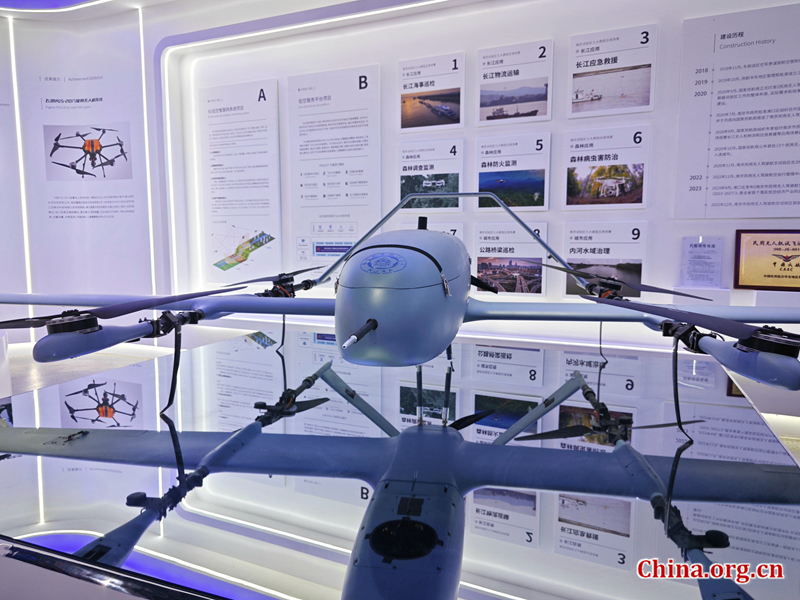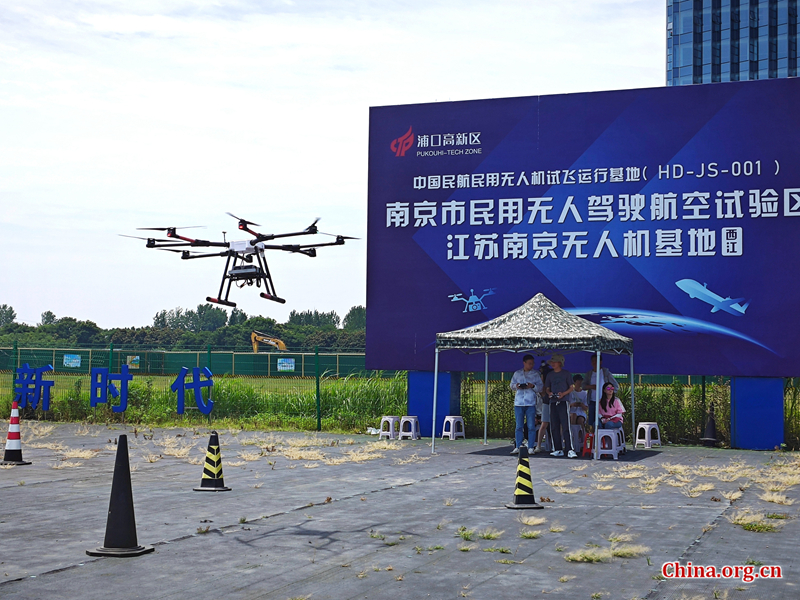
 0 Comment(s)
0 Comment(s) Print
Print E-mail China.org.cn, June 5, 2024
E-mail China.org.cn, June 5, 2024
At this year's "two sessions," China's annual key political meetings, the "low-altitude economy" concept was introduced for the first time in the government work report and identified as a key task for fostering new growth in 2024. Among the early adopters of this trend has been Nanjing, the capital of the eastern coastal province of Jiangsu.
In October 2020, Nanjing secured approval for its civil unmanned aerial vehicle (UAV) test zone, becoming one of the first 13 such zones in China. By 2023, the test zone had logged 24,568 UAV flights, totalling 6,118.7 flight hours.

The drone operations control room at the Nanjing Civil Unmanned Aviation Operation Management Center, Nanjing, Jiangsu province, June 4, 2024. [Photo by Wang Yiming/China.org.cn]
According to Zhu Wei, director of the Coordination Department at the Nanjing Development and Reform Commission, Nanjing currently boasts nearly 200 companies along the low-altitude economy industrial chain, positioning itself at the forefront nationwide.
In the field of low-altitude manufacturing, Nanjing is home to around 20 drone manufacturers, including Changkong Science and Technology Co. Ltd., as well as electric vertical takeoff and landing (eVTOL) research and production companies such as EVT-Aerotechnics. Additionally, a cluster of small- and medium-sized enterprises in the city are engaged in flight services related to surveying, navigation and aerial tourism.
These companies have developed diverse applications, ranging from maritime inspections and hydrological monitoring to forest fire prevention, bridge inspections and emergency rescue, Zhu said.
Huo Min, deputy general manager of the Science and Innovation Group in Nanjing's Pukou High-Tech Zone, highlighted specific applications: "Nanjing has already implemented scenarios such as Yangtze River inspections, river logistics, blood transportation and urban comprehensive management."
Taking blood delivery as an example, Huo said that they have successfully completed flights transporting blood between the Nanjing Red Cross Blood Center and Pukou People's Hospital as well as Pukou Traditional Chinese Medicine Hospital. These routes operate around the clock, with daily flights varying based on real-time needs. Over the past three months, they have conducted a total of 400 flight missions, she said.
Yan Xuefeng, director of the Drone Research Institute at Nanjing University of Aeronautics and Astronautics and general manager of Nanjing Changkong Science and Technology, emphasized their comprehensive research efforts since 2018. "We have explored various aspects of the low-altitude economy, including top-level planning and design, infrastructure construction, key technological breakthroughs, management platform development, aircraft design and manufacturing, and practical demonstrations of typical applications."

A model of the FG30V drone developed by Nanjing Changkong Science and Technology, Nanjing, Jiangsu province, June 4, 2024. [Photo by Wang Yiming/China.org.cn]
To further accelerate growth of the low-altitude economy, Nanjing unveiled the Implementation Plan for Promoting High-Quality Development of the Low-Altitude Economy in Nanjing (2024–2026) in May. The plan sets specific targets, including achieving an industry scale exceeding 50 billion yuan by 2026, establishing over 240 takeoff and landing sites, and nurturing more than 30 demonstration application scenarios.

Students take part in drone license exams at a drone pilot license training and examination center in Nanjing, Jiangsu province, June 4, 2024. [Photo by Wang Yiming/China.org.cn]
Go to Forum >>0 Comment(s)